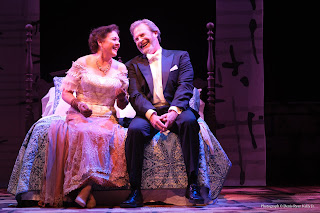Indianapolis Opera presents 'A Little Night Music,' a sexy comedy of Scandinavian manners
"Send In the Clowns" is a rarity among modern musical-theater hits in being selectively lifted from the show by singers who simply want to do it, even though Stephen Sondheim's most popular song is thoroughly nestled in, and essential to, "A Little Night Music."
A production of the sometimes blithe, sometimes sentimental operetta by Indianapolis Opera runs through today at the Toby at Newfields. Predictably, "Send In the Clowns" went over superbly as delivered by the aging actress Desiree Armfeldt in the second act. The song can best be understood in context, despite the way it has been put across by everyone from Frank Sinatra to Renata Scotto.
 |
| Desiree and Frederik refresh their bond. |
Here it was beautifully set up by the orchestra, under the sensitive direction of Alfred Savia, and performed within an aura of Desiree's cherished memories and indelible regret by Heather Hertling Narducci. In the reprise, she was joined by Daniel Narducci (her husband) as Fredrik Egerman, a lawyer who can make a case for himself in every situation, then undermine it. In romantic matters, flightiness takes a sorry toll, however much the richness of life's variety might be enjoyed. That critique is glumly voiced by Fredrick's emotionally tortured son Henrik, a Lutheran pastor in training.
The three are among the weekend guests of the materfamilias Madame Armfeldt, Desiree's mother, who from a wheelchair shares her version of settled wisdom with her granddaughter, Fredrika (curious and charming in Zoe Lowe's performance). That perspective, often expressed in barbed opinions, rests upon an earlier life rich in romantic liaisons. The old lady sums them up in a song of that title that was among the triumphs of Kathleeen Hacker's performance Saturday night.
Also present are Anne, Fredrik's new wife, dense and virginal. More seasoned, and bitter about it, is
 |
| Madame Armfeldt tells her granddaughter all about life. |
Countess Charlotte Malcolm, wife of a vain, philandering dragoon, Carl Magnus Malcolm, who is also Desiree's current lover.
Such a Rubik's cube of relationships sounds unsortable. Only the lingering twilight of a Scandinavian summer offers any hope of resolution. Sondheim's music, with a clever book by Hugh Wheeler, has plenty of relationship cuds to chew on, and the storied creative team was up to the task.
"The Glamorous Life" is their sardonic riposte to "There's No Business Like Show Business." It percolated in performance, and you could catch every word, thanks to supertitles. Every character is ready with a host of mixed feelings for "A Weekend in the Country," the first-act finale that the cast performed with exceptional flair.
This production's director, A. Scott Parry, can hardly be blamed for cultivating characterizations that border on spoof. As consequential as these folks' life choices may be, the scenario requires two-dimensional hilarity to prevail. Especially wholehearted about this approach was the aristocratic pair, played with gusto by H. Conor Angell and Anne Fuchs. When the Count finally works up his jealousy toward Fredrik to the fever pitch of a duel challenge, Charlotte's ecstasy is almost orgasmic. It was a very funny representation of the sexual charge that often accompanies jealousy.
 |
| Petra (Liz Culpepper) shares perspective with her swain. |
Among other solo turns worth celebrating is that of Liz Culpepper as the maid Petra, whose "The Miller's Son" overflowed with the zest of a wandering eye and a free disposition; what's more, she has a chest voice worthy of Marilyn Horne. In the comic duet sphere, "You Must Meet My Wife" gave the Narduccis delectable opportunity to secure their portrayals, as Fredrik tries to paper over his error in giving up the now-scornful Desiree years ago and settling for marriage to a dim, pretty ingenue (played to the hilt by Rachel Kobernick).
As the socially maladroit son Henrik, Jonathan Elmore gave an outsized interpretation of the conflicted, holier-than-thou stereotype, the sort who might make Kierkegaard or a Strindberg character seem well-adjusted. The characterization was well supported by his intense, blossoming tenor.
The musical accompaniment always sounded spiffy under Savia's direction. T'he occasional underscoring — during "A Weekend in the Country" and "Send In the Clowns," especially — was consistently well-managed, buoying up the singers. Sets and lighting were nicely judged as appropriate to the evolving and contrasting tone of each act. In terms of production cohesiveness, the smiles of a summer night beamed down upon this rowdy and occasionally remorseful company of guests and hosts.
[Photos by Denis Ryan Kelly Jr.]


Comments
Post a Comment